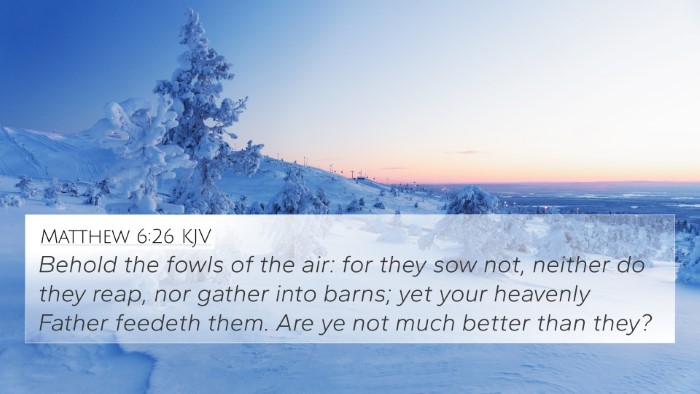Understanding Luke 12:7
Luke 12:7 states: "But even the hairs of your head are all numbered. Fear not; you are of more value than many sparrows." This verse offers a profound reminder of God's intimate knowledge of and care for each individual. In this context, the insights provided by various public domain commentaries shed light on its meaning.
Combined Insights from Public Domain Commentaries
This verse emphasizes the value God places on human life and the intimate attention He gives to each person. Matthew Henry explains that this verse reassures believers of God’s providence, as He knows the smallest details about us, including the number of hairs on our heads. He notes that the mention of sparrows serves to illustrate God's care in comparison; if God values even the insignificant sparrows, how much more valuable are humans, made in His image?
Albert Barnes further elaborates by indicating that this awareness of personal details signifies God’s profound relationship with His creation. He points out that believers should not fear life’s uncertainties, as God’s care for them far exceeds that of lesser creatures.
Adam Clarke adds that this verse signifies a spiritual connection to God since knowing the hairs on one's head suggests an all-encompassing knowledge and care. He points out that the phrase, "Fear not," is a common biblical exhortation, encouraging trust in divine protection and provision.
Thematic Connections
This verse not only encourages believers but also connects them to a larger biblical narrative about God’s care and providence. Thematic connections can be drawn from various scriptures that echo similar sentiments:
- Matthew 10:29-31: This passage reiterates the idea of God's awareness of even the smallest creatures, stressing human value.
- Psalm 139:1-4: This Psalm discusses God's omniscience, highlighting His full knowledge of us before we even speak.
- 1 Peter 5:7: Encourages believers to cast their anxieties on God, who cares for them.
- Isaiah 41:10: A reminder not to fear because God is with us, supporting the sentiment found in Luke 12:7.
- Romans 8:31: Asserts that if God is for us, who can be against us, reinforcing the value we have in His eyes.
- Matthew 6:26: Encourages reliance on God’s provision, reminding us of the birds that are cared for by Him.
- Job 14:5: Speaks to God's sovereign knowledge over every individual, including their lifespan.
Cross-Referencing Biblical Texts
To understand Luke 12:7 in depth, one can utilize Bible cross-reference tools like a Bible concordance or cross-reference guide. Cross-referencing helps believers to draw connections between different Bible verses, enriching their understanding through comparative studies.
Benefits of Cross-Referencing
Using cross-references can lead to deeper insights into biblical themes, such as:
- Identifying connections between Old and New Testaments: Understanding God's eternal nature and consistent care throughout Scripture.
- Detailed cross-reference between Gospels: Observing how the same message of God’s care is presented diversely in Matthew, Mark, Luke, and John.
- Cross-referenced themes in the Bible: Examining how the theme of God’s providence is reiterated in different contexts.
Conclusion
In summary, Luke 12:7 encapsulates a powerful truth about God’s care for humanity and encourages believers to trust in His providence. Through spiritual and thematic connections, as well as effective cross-referencing techniques, individuals can gain a comprehensive understanding of not just this verse, but a multitude of related biblical texts. This holistic view allows for enriched interpretation and application of Scripture in everyday life.
Further Study and Reflection
For those looking to deepen their scriptural knowledge and application, utilizing comprehensive Bible cross-reference materials may provide essential insights for sermon preparation and personal study. Understanding verses like Luke 12:7 within the broader biblical context can significantly enhance one's spiritual growth and comprehension of God’s Word.












